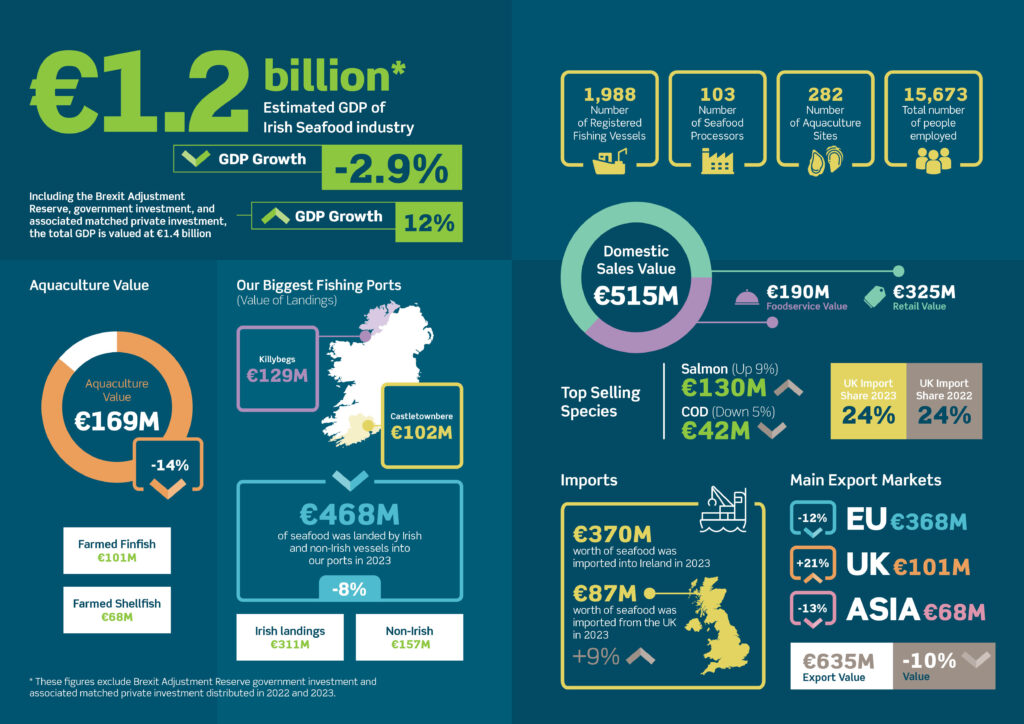Government spending boosts Irish seafood industry in 2023 amid challenges

The Irish seafood economy faced a challenging year in 2023, with a 2.9% decline in GDP from 2022 to a total value of €1.2 billion, according to data in the Business of Seafood report by Bord Iascaigh Mhara (BIM) published today 18/09/2024. Brexit posed a significant challenge to the industry, reducing access to fish and disrupting trade flows and market access. However, in response, there was an unprecedented level of government investment in the industry, demonstrating a strong commitment to the future growth and sustainability of the sector. This investment, combined with Brexit Adjustment Reserve (BAR) funding, helped the sector achieve significant growth of 12%, bringing the total value to over €1.4 billion, despite the initial decline of 2.9% in GDP from 2022, which valued the sector at €1.2 billion.
Quota reductions resulting from Brexit, reduction in foreign landings, and biological issues in salmon and shellfish production, resulted in pressures in 2023. The sector also faced challenges from the cost-of-living crisis and high inflation, further affecting the economic environment. Access to raw materials, particularly for pelagic processing, remained a critical issue resulting in a 10% decrease in exports of key Irish seafood products, with the most pronounced reductions in blue whiting, crab, and Irish organic salmon.
Despite these challenges and the difficulties posed by rising costs and regulatory changes, there were significant increases in public and private investment. Increased Government spending in 2023 as part of the BAR was at a record level, increasing public spending by 63% to €416 million, leading to significant increases in private investment by 33%.
Consumption of seafood in 2023 increased by 9% to €515 million. The sale value of salmon grew by 9% to €130 million, and the seafood foodservice sector grew by 13% in 2023 to €189 million, just 3% off its peak in 2019. Foodservice operator purchases of seafood increased by 14%.
The report highlights how almost 15,673 adults work, directly and indirectly, in Ireland’s seafood industry. Nationally, the seafood sector accounts for 6 in every 100 jobs in coastal communities around Ireland, increasing to a rate of 14% in coastal communities of Co. Donegal.
Commenting on the report’s data, Minister for Agriculture, Food and the Marine Charlie McConalogue T.D said: “The seafood industry plays a vital role in the sustainable, social and economic viability of our rural coastal communities and its importance is again evident in this year’s Business of Seafood report. Governments unprecedented level of investment, demonstrating its commitment to supporting the seafood industry through the challenges of Brexit, is reflected in the BIM analysis. The surge of funding provided by the Seafood Taskforce Schemes, funded through the Brexit Adjustment Reserve, has supported resilience building and diversification across coastal communities and the fisheries sector to assist in mitigating the impacts of the UK’s withdrawal from the European Union.”
CEO of Bord Iascaigh Mhara (BIM) Caroline Bocquel said: “There is no doubt the global backdrop for 2023 has been very difficult for all industries, including the Irish seafood industry. The industry continues to weather the aftershocks of the UK’s exit from the European Union, a pandemic, inflation, record energy costs, and ongoing impacts of the war in Ukraine.”
The report reveals the difficult conditions faced by Ireland’s pelagic sector, with export volumes for key species such as blue whiting falling by 65% to a value of €14 million. While there was strong growth in fish meal and oils, lower quotas for horse mackerel and smaller blue whiting sizes heavily impacted the export value, significantly impacting the pelagic sector.
The volume of Irish organic salmon produced in 2023 declined by almost one third to 9,400 tonnes, with production impacted by high mortality rates across farms in Ireland. However, strong international demand resulted in the export value declining by just 3% due to an increase in the average price.
A significant number of schemes recommended by the Seafood Taskforce were introduced by Minister McConalogue to support different sectors within the industry in 2023, ranging from liquidity schemes to capital support and funding for community-led development.
“Despite the challenges faced in 2023, the Irish seafood industry remains resilient and committed to sustainable growth in the future. The investment made by the Government in 2023 will result in increased opportunities for companies who now have one of the most modern seafood processing sectors in Europe, which we will start to see at the end of 2024 and into 2025. For the first time in four years, imports from the UK have not declined after the changes to trading brought about by the UK’s departure from the European Union, and sales of seafood in Ireland’s food service sector are almost back at pre-pandemic 2019 levels, valued at €189 million,” said Caroline Bocquel.
You can read the full report online here: Business of Seafood Report 2023
